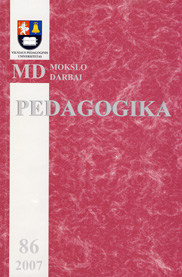Argumentavimas: samprata ir didaktinės perspektyvos (1)
Argumentation: Concept and Didactic Opportunities (1)
Author(s): Zita NauckūnaitėSubject(s): Education
Published by: Vytauto Didžiojo Universitetas
Keywords: argumentation; argumentation competences; reasoning; exposition; didactic opportunities.
Summary/Abstract: The present article has been provoked by the recent changes in the Lithuanian school reąuirements of the finai examination for die General Education Certificate. From 2008 the Finai exam of the Lithuanian native examination will include the task of writing an argumentative non-fiction essay as an alternative to the interpretation ofthe text. These changes have brought some problems and challenges both for the teachers of the subject and for die developers ofthe program. First of all, the type ofthe text is not clearly defined in the program. An essay is named as "non-fiction reasoning text writing" whereas die concept reasoningis understood as exposition and argumentation taken together, i. e. there is no distinction made between exposition and argumentation. The schoolchildren are also required to make hypodieses in diey essays, even diough hypodieses belong to die academic writing. The definition of writing type is an important one because of simplistic categorization between narrative, descriptive and reasoning writing which is derived from 19th century rhetorical theory and which has not been changed until the present day. Secondly, the teachers ofthe subject feel that they are not qualified or competent enough to teach their students die skills of writing essays. A number of teachers refuse to prepare students for reasoning about social and existential issues; instead, they focus exclusively on literature, language and culture, because diey are trained in the literary tradition. Thirdly, the survey of national achievements of Lithuanian schoolchildren demonstrates that the schoolchildren find it especially difficult to give reasons or arguments in written. Excellent argumentation (A level) was presented by 4, 3 per cent schoolchildren of the 8th grade (in the year of 2004) and by 7 per cent schoolchildren ofthe 10th grade (in the year of 2005). The present article makes a review of essential concepts of reasoning, exposition and argumentation. Argumentation dieory and its didactic approaches have also been considered. The vision ofthe application of die argumentation as a product, a process and a procedure for didactic purposes has been presented.
Journal: Pedagogika
- Issue Year: 2007
- Issue No: 86
- Page Range: 135-141
- Page Count: 7
- Language: Lithuanian

